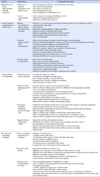Abstract
Purpose
This study was conducted to examine the adaptation experience of male nurses working in general wards.
Methods
Experiential data was collected from 16 general ward nurses through in-depth interviews. Participants were selected from male nurses working in the general wards with over one year of clinical experience at a tertiary university hospital. The main question was “Can you describe your adaptation experience in the general ward as a nurse?” All interviews were recorded and transcribed, then analyzed using Colaizzi's method.
Results
Four categories were derived from the analysis: ‘difficulties from task adaptation by characteristics’, ‘limited nursing situation and circumstance as a male nurse’, ‘efforts to adapt at general nursing unit’, and ‘self-worth, and worry about something as a male nurse’.
Conclusion
Male nurses had a difficulty adapting to work in wards due to lack of multi-tasking skills, as well as some social prejudice or negative views on male nurses. Establishing reasonable guidelines for male nurses in practice, promoting their responsibilities to patients, developing mentoring programs, and reassessing the policy of assigning male nurses to general wards are recommended to help in better adaptation.
References
1. Ahn KH, Seo JM, Hwang SK. Content analysis of male hospital nurses' experiences. J Korean Acad Adult Nurs. 2009; 21(6):652–665.
2. Korea Nurses Association. Statistics of male nurses. [Internet]. Seoul: Korea Nurses Association;2015. cited 2016 April 30. Available from: http://www.koreanurse.or.kr/resources/statistics.php.
3. Hwang ES. Mr. Nightingale! the era of twenty thousands soon. Weekly Chosun. 2014. 04. 24. http://news.chosun.com/site/data/html_dir/2014/04/24/2014042402440.html.
4. Brad S, Dennis S, Randolph R, Sherrod B, Sherrod D, Rasch R. Wanted: More men in nursing. Men Nurs. 2006; 1(1):34–39.
5. Son HM, Koh MH, Kim CM, Moon JH. The male nurses' experiences of adaptation in clinical setting. J Korean Acad Nurs. 2003; 33(1):17–25.
6. Evans J. Men in nursing: Exploring the male nurse experience. Nurs Inq. 1997; 4(2):142–145. DOI: 10.1111/j.1440-1800.1997.tb00089.x.
7. McMillian J, Morgan SA, Ament P. Acceptance of male registered nurses by female registered nurses. J Nurs Scholarsh. 2006; 38(1):100–106. DOI: 10.1111/j.1547-5069.2006.00066.x.
8. Lee KJ, Kim MY. The relationship of gender role conflict and job satisfaction upon organizational commitment in male nurses. Korean J Adult Nurs. 2014; 26(1):46–57. DOI: 10.7475/kjan.
9. Mackintosh C. A historical study of men in nursing. J Adv Nurs. 1997; 26(2):232–236. DOI: 10.1046/j.1365-2648.1997.1997026232.x.
10. Rangel S, Kleiner K, Kleiner B. New developments in sex discrimination of male nurses. Insights Changing World J. 2011; 1:27–35.
11. Rowlinson L. Lived experience of being a nurse from a male and female perspective. Br J Nurs. 2013; 22(4):218–222.
12. McLaughlin K, Muldoon OT, Moutray M. Gender, gender roles and completion of nursing education: A longitudinal study. Nurse Educ Today. 2010; 30(4):303–307. DOI: 10.1016/j.nedt.2009.08.005.
13. An ES, Chu SK. Study on male nurses' gender stereotype and job satisfaction. J Korean Acad Nurs Adm. 2011; 17(1):14–21.
14. Rajacich D, Kane D, Williston C, Cameron S. If they do call you a nurse, it is always a “male nurse”: Experiences of men in the nursing profession. Nurs Forum. 2013; 48(1):71–80.
15. Kim HS. The job changing experience of a male nurse [master's thesis]. Seoul: Hanyang University;2013. 136–157.
16. Kim IJ. Q study of images on male nurses [Dissertation]. Busan: Kosin University;2014. 25–70.
17. Lee BH. Comparison of job stress between male and female nurses [master's thesis]. Ulsan: University of Ulsan;2014. 14–28.
18. Choi JH. Related factors the job satisfaction, burnout and turnover intention of male nurses [master's thesis]. Busan: Dong-A University;2011. 17–43.
19. Park KW, Kim JK. A study on experience of transition from new clinical nurse to competent step. Korean Acad Soc Nurs Educ. 2013; 19(4):594–605. DOI: 10.5977/jkasne.2013.19.4.594.
20. Patton MQ. Qualitative evaluation and research methods. 2nd ed. Thousand Oaks, CA: SAGE Publications;1990.
21. Colaizzi PF. Psychological research as the phenomenologist views it. In : Vaile R, King M, editors. Existential phenomenological alternatives for psychology. New York: Oxford University Press;1978.
22. Guba EG, Lincoln YS. Effective evaluation: Improving the usefulness of evaluation results through responsive and naturalistic approaches. San Francisco, CA: Jossey-Bass;1985.
23. Kim SY, Park KO, Kim JK. Nurses' experience of incivility in general hospitals. J Korean Acad Nurs. 2013; 43(4):453–467. DOI: 10.4040/jkan.2013.43.4.453.
24. Evans J. Men in nursing: Exploring the male nurse experience. Nurs Inq. 1997; 4:142–145. DOI: 10.1111/j.1440-1800.1997.tb00089.x.
25. Milligan F. Experience before and through the nursing career, The concept of care in male nurse work: An ontological hermeneutic study in acute hospitals. J Adv Nurs. 2001; 35(1):6–7. DOI: 10.1046/j.1365-2648.2001.01818.x.
26. John RK, Chad EO, Michael K, Ponton M. Perceptions of gender-based barriers for men in an online nursing completion program compared to traditional n-campus nursing programs. J Online Learn Teach. 2013; 9(4):481.
27. Ahn MK, Lee MH, Kim HK, Jeong SH. Job satisfaction, organizational commitment and turnover intention among male nurses. J Korean Acad Nurs Adm. 2015; 21(2):203–211. DOI: 10.11111/jkana.2015.21.2.203.




 PDF
PDF ePub
ePub Citation
Citation Print
Print



 XML Download
XML Download